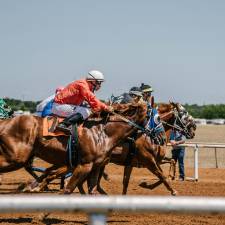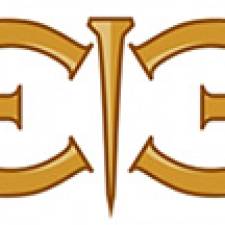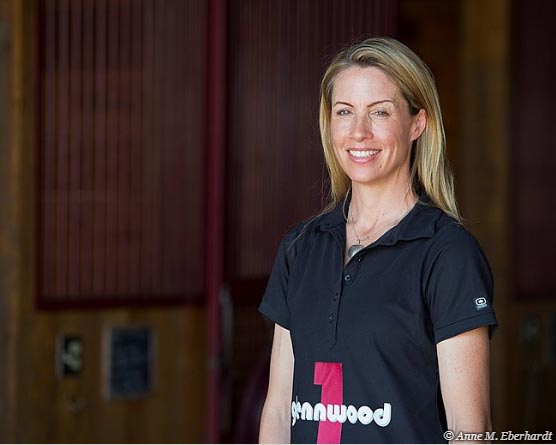
by Meredith Daugherty
With Justify becoming just the 13th Triple Crown winner in history and now unbeaten Without Parole taking home his first graded win across the pond at Royal Ascot, owner/breeder Tanya Gunther is having a good year. Part of the father/daughter team that owns and operates Glennwood Farm in Kentucky, Tanya has combined her passion for pedigrees with her skills as a former investment banker to catapult her farm to the peak of classic success. BloodHorse Marketwatch recently spoke with Tanya about what makes her operation unique and how she plans to top a banner year.
MarketWatch: What drove you to leave your successful career in finance to pursue work in the Thoroughbred industry?
Tanya Gunther: My father started out breeding a few mares on our farm in Langley, Canada, so I grew up around them, as well as riding horses. My sister and I both spent a great deal of our spare time after school or during school holidays riding and competing in the hunter/jumper and equitation worlds. We also attended the races at Hastings Park in Vancouver as a family, spending many weekends at the track. After high school, I went directly to university to pursue a business degree (University of British Columbia, Bachelor of Commerce) and then, after working in finance for a couple of years in Vancouver, I moved to London to obtain my master's in Finance at London Business School and begin a career in investment banking. After several years in investment banking in London, I decided to leave the finance industry and focus on my passion, which was Thoroughbred horse racing. By that time, my father had grown his "horse habit" substantially, having purchased and developed Glennwood Farm in Kentucky, taking his breeding operation to an entirely new level.
MW: Your father credits your encyclopedic knowledge of pedigrees for much of the success Glennwood has achieved. What first drew you to studying pedigrees?
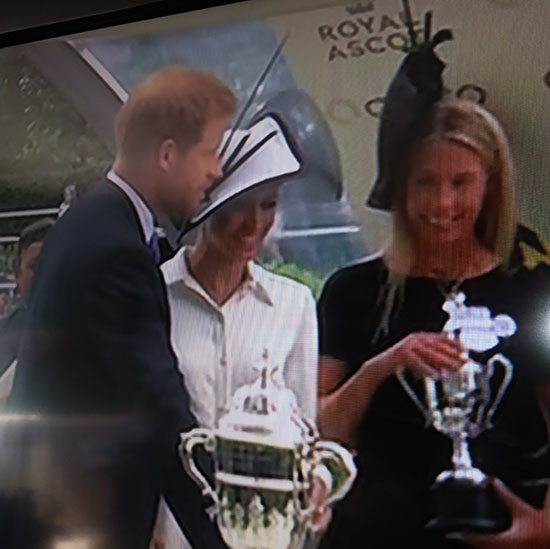
TG: I have always been fascinated by pedigrees. As a child, we had a family friend named Albie who would come over on the weekends and would always bring stallion brochures that he must have received in the mail and would pass these along to me (he also brought donuts but, sadly, my mom put a stop to that!) I loved getting my hands on these brochures, and he must have enjoyed seeing my interest and curiosity, so this small tradition carried on for years. I would read through the brochures, running my eyes across the photos and all the names in the pedigrees through each generation. I can't say what I hoped to achieve at that young age, but I sure liked doing it, and I remember certain names like Nasrullah and Princequillo that stood out, since these names appeared frequently. My father was also always immersed in Thoroughbred magazines on the weekends throughout my childhood (and still is today!) and so I was exposed to this obsession from an early age. Possibly, in my own way, I was copying him, and I guess it is no mystery that his infatuation with racehorses became mine as well. The foundation for all of this, though, was a love of horses. I loved and had an affinity for horses at a young age, and so anything about them interested me.
MW: Do you feel that your time as an investment banker is to your advantage when you're looking at pedigrees and statistics? Skills that might give you a bit of an edge or help you look at bloodlines with a more analytical eye?
TG: My background in investment banking absolutely informed the way I approach pedigrees and mating selections now. Of course, this wasn't part of some grand plan with me knowing I was going to ultimately focus on the horse racing industry after a stint in finance. When I decided to leave investment banking, I had been thinking about it for at least two years before I finally worked up the courage to jump ship. I had worked extremely hard to get there and had worked a grueling schedule with astonishing workloads for years, so it was a massive leap of faith to give up what I had worked so very hard for. Reflecting on that experience, I can see what a significant role it played in how I approach everything in the horse industry now. My work ethic, attention to detail, and analytical approach are all things I learned and brought with me from this prior career.
MW: Breeding can be such a game of trial and error. What is your personal strategy when you look to set up a mating? Do you have certain races in mind like the American classics? Or is it more a challenge of trying to create athleticism overall?
TG: Our breeding program is focused primarily on trying to breed the best athletes we can produce, typically classic-distance and hopefully classic-quality horses.
MW: In terms of sire power, do you lean toward what is more commercially popular? Or do you run more strictly along the lines of how you think the pedigrees will best complement each other? Or is it a more of a balance?
TG: Most of our horses go through the sale as yearlings, so in order to be commercially viable, it is important to have an understanding of what is attractive to the commercial market. However, it is a balancing act because our primary goal is to breed top racehorses, not just top horses commercially. For me, it is hugely disappointing if a yearling sells well but doesn't go on to prove he or she was worth it by performing well on the track. Toward the end of 2013 when we made the decision to breed Stage Magic to Scat Daddy, and Mythical Bride to Curlin in 2014 (to ultimately produce Justify and Vino Rosso, respectively), neither stallion was very commercial at that time, so it was a calculated risk based in part on each stallion's progeny performance, not proven commercial success. We were aiming to breed racehorses and hoped the commercial market would have caught up by the time we took these horses to the market.
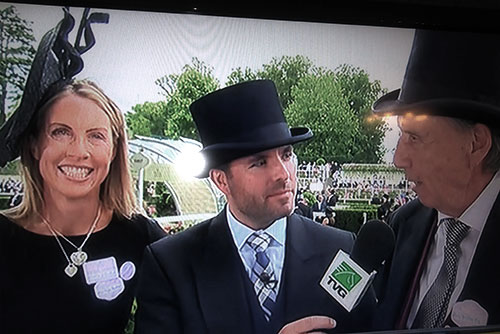
MW: Do you find the market has changed over the years with more emphasis being placed on the top end where you could possibly find a classic winner?
TG: I remember thinking how polarized the yearling market had become, about a handful of years ago. After the yearling sales in 2014, I recall discussing with my father how we needed to reduce and reshape our broodmare band to address the market dynamics, so we reduced more than usual in the Autumn of 2015. Although the market remains polarized, there was a feeling of optimism in the market last year, and the middle market seemed more robust than it had been in recent times.
MW: Glennwood has bred or co-bred several grade 1 winners before Justify. What set him apart for you? Do you remember him as being different from the other winners you've bred?
TG: I believe top horses can come in different shapes, sizes, and demeanors. Looking at the grade 1 horses produced by Glennwood, there is a substantial amount of variation in body type, development trajectory, and personality.
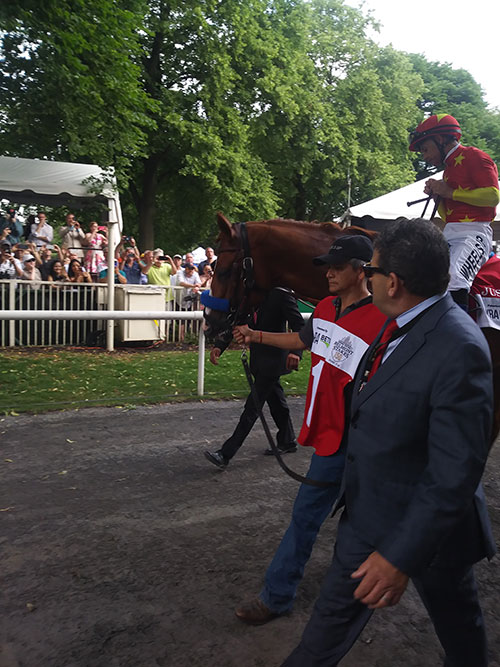
From an early age, Justify stood out from his peers in terms of size, mass, and strength. He was clearly intelligent and had an air of confidence and superiority seemingly almost from birth. As a yearling, he was physically imposing, and he was almost in your face with it due perhaps to his abundant energy and dominant nature. Comparing him to other of our top horses, Justify was perhaps a more obvious standout in that he had more of these important attributes all at the same time.
MW: How did undefeated Without Parole come out of the St James's Palace Stakes (G1)?
TG: Without Parole is doing well post the St James's Palace Stakes, and the Sussex Stakes (G1) at Goodwood is the likely next target for him.
MW: This has really been a storybook year for you and your father and Glennwood Farm—from Vino Rosso to Justify to Without Parole. Where do you go from here?
TG: My dad informed me yesterday that I now need to breed an Epsom Derby (G1) winner and a Prix de l'Arc de Triomphe (G1) winner. Just like that, easy-peasy. No pressure!
This article appeared in Bloodhorse.com and is re-printed here with permission. Find out more about Thoroughbred Breeding in our section right here on EIE.









